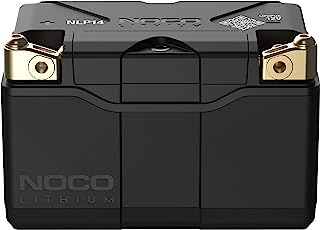5 important factors worth considering when looking for the best lithium ion batteries for motorcycles
When deciding to upgrade your motorcycle’s battery, choosing a lithium-ion battery can greatly improve your riding experience. It’s important to look beyond just the technical specs and consider factors like durability, performance, and value. By understanding these details, riders can make smart choices that improve their motorcycle’s performance and make their ride smoother and more efficient.
See our guide to the best lithium ion batteries for motorcycles.
Capacity
When buying a lithium-ion battery for your motorcycle, it’s important to consider its capacity. The capacity of a battery tells you how long it can power your motorcycle before needing to be charged again. This is a key factor for any rider to think about. Choosing a battery with a higher capacity can give you more time to ride and fewer interruptions for recharging. This means you can take longer trips without always worrying about your battery life. Getting a high-capacity lithium-ion battery can make your motorcycle rides better by removing the worry of suddenly losing power and letting you focus on the road.
Having a battery with plenty of capacity doesn’t just increase how far you can ride; it also helps your motorcycle perform more reliably. Picking a lithium-ion battery with a higher capacity ensures your bike gets a steady supply of power, which keeps its performance at its best throughout your ride. In today’s world, where being efficient and reliable is important, choosing a battery with enough capacity is a wise decision that can greatly boost your motorcycle’s overall efficiency and performance. Giving priority to capacity when choosing a lithium-ion battery for your motorcycle is a smart move that can make your rides more enjoyable and stress-free.
Voltage
When you’re buying lithium-ion batteries for motorcycles, one important thing to think about is the voltage rating. Getting the right voltage can really affect how well your motorcycle performs. Batteries with higher voltage give more power, which can make your bike accelerate faster and perform better overall. They also tend to last longer and provide consistent power over a long period of time.
On the other hand, batteries with lower voltage might be better if you want a balance between power and efficiency. They may not give you as much instant power as higher voltage options, but they are usually more energy efficient. This makes them great for longer trips or everyday rides. Ultimately, the voltage you choose depends on how you like to ride. Whether you want a lot of power or to conserve energy, picking the right voltage for your lithium-ion battery is key to getting the most out of your motorcycle.
Size/fitment
When it comes to choosing lithium-ion batteries for motorcycles, size and fit are very important. If the battery doesn’t fit correctly in your bike, it can cause problems. A battery that doesn’t fit well can be hard to install and can even be dangerous while you’re riding. Making sure the dimensions of the new battery match your motorcycle’s specifications is key for a smooth experience.
Having the right size and fit for a lithium-ion battery can affect how well your motorcycle performs and how long it lasts. A battery that fits well can improve how power is delivered to your bike and make it more reliable. It might take some extra work to find a battery made for your specific motorcycle model, but it’s worth it in the long run. Prioritizing size and fit when buying a lithium-ion battery for your motorcycle is an important step in making sure you have a great riding experience and your bike lasts a long time.
Weight
When selecting lithium-ion batteries for motorcycles, it’s important to consider weight alongside other specifications like capacity and power output. Ignoring weight can impact the bike’s performance, affecting handling and agility, especially when turning or navigating tight spaces. Opting for a lighter lithium-ion battery can reduce the overall weight of the motorcycle, improving balance and stability, ultimately enhancing the riding experience.
In addition, the weight of the battery influences the efficiency and range of the motorcycle. A lighter battery puts less strain on the motor, leading to better energy usage and increased mileage per charge. Those aiming to enhance their bike’s performance and save energy should think about the weight of the lithium-ion battery. Overall, choosing a lightweight battery not only enhances handling and maneuverability but also boosts efficiency and range, making it an important factor to consider when buying a new battery for your motorcycle.
Quality/brand reputation
When investing in lithium-ion batteries for motorcycles, it’s important to focus on quality and brand reputation. These batteries are essential for electric motorcycles, affecting how well they run. Choosing a well-known brand that is reliable and long-lasting can greatly impact how long your motorcycle’s battery lasts and how well it works. A trusted brand not only means the battery is well-made and uses advanced technology, but it also gives riders a sense of security, knowing they are supported by a company with a history of battery innovation and safety. Quality and brand reputation are key when it comes to lithium-ion batteries, ensuring a trouble-free riding experience for motorcycle enthusiasts who care most about performance and reliability.
Conclusion
Lithium-ion batteries have totally changed the motorcycle world by providing great power, efficiency, and lastingness. They are light and work really well, making them the top pick for riders who want a trustworthy and environmentally friendly energy source. As technology gets better, lithium-ion batteries will become even more popular, changing how motorcycles are made. Riders can be excited about this new technology because lithium-ion batteries are the future of motorcycle power, giving them an exciting and eco-friendly ride for a long time.
